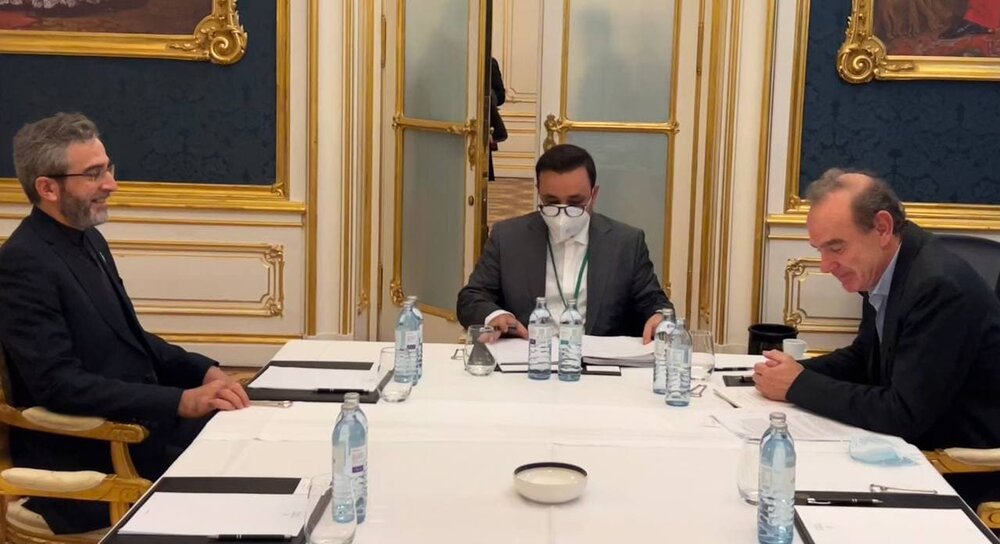INSUBCONTINENT EXCLUSIVE:
Iran and the United States to resolve lingering disputes, not just the nuclear issue, between themselves.In an exclusive interview with the
help of participants to the nuclear deal talks, particularly the European Union.Following is the text of the interview:Question: The
In your view, what steps are needed to be taken to create hope for a restoration of the agreement?Answer: On the surface, there are specific
unresolved issues such as the removal of the IRGC from the FTO list that are apparently creating the current impasse
But, in my view, the lack of any understanding between Iran and the United States and any effort to that end is much more important than
I believe the lack of deep engagement between these two main parties is one of the major impediments in the way to reach the understanding
necessary to clear the way
The nuclear deal is just one of them
Dialogue between them may not necessarily aim to resolve those dozen issues, but may help the parties to understand each other better
And that would help address the specific issues that are blocking progress in the Vienna negotiations
Speaking specifically on the issues at hand in the negotiations, I believe that the US officials should answer the proposals Iran conveyed
to them through Enrique Mora
JCPOA would be a great gift to Trump and other Iran hawks?A: Of course it is
failure and leave the table
At the same time, they have been threatening that a would-be Republican president in January 2025 would withdraw again from the JCPOA if the
A letter of 2015, orchestrated by Senator Tom Cotton and signed by 47 Republican senators, vowed to have the deal nullified by the next
Trump senselessly took the United States out of the deal against the advice of his close colleagues such as the then secretaries of State
and Defense and his National Security Adviser and his European allies
What he did was based on an ideological illusion and not on the concrete United States national interest
The fact that nothing stemmed from the so-called maximum pressure is indicative of the foolishness of that policy.Q: Trump put the IRGC, a
branch of the Iranian military, on the FTO list to make a JCPOA revival difficult
However, experts and certain current and former officials, including Javier Solana and Carl Bildt, or Republican Senator Rand Paul, believe
do with the nuclear agreement?A: There is no doubt that the inclusion of the IRGC on the FTO list was a machination aimed at making
difficult the return to the JCPOA for the incoming Democrat president
And unfortunately that machination is apparently successful
In the meantime, it is quite right that in the case of the IRGC, the designation is largely symbolic
Because the IRGC and all entities and persons connected to it are already subject to extraterritorial sanctions by the laws, such as CISADA,
and executive orders and remained so despite the 2015 JCPOA, because those sanctions on the IRGC were related to non-nuclear issues, such as
human rights, terrorism, regional issues and missile program
However, the Biden administration should understand that the designation came following the withdrawal of Trump from the deal
Thus, Iran reasonably seeks to have that designation lifted, as it is one of the actions made by the Trump administration that aimed to
that the most important hurdle is that the United States is not ready to guarantee that Iran can freely enter business deals with the
If so, why does the United States is trying to constrain Iran economically?A: If it is the case and the FTO designation is not the main
issue, then going back to the negotiating table is much more important and necessary
Through negotiations with the help of the other JCPOA participants, especially the EU, the United States and Iran should be able to reach a
Naftali Bennett is resorting to assassinations and other vicious acts to kill the slightest hope to revive the JCPOA
They did whatever in their power to prevent the Obama administration to reach agreement with Iran and they failed miserably
In parallel, at least since 2009 they resorted to all sorts of sabotage and terrorist acts to create tension in the relations between Iran
and the West and at the same time subvert and disrupt the Iran nuclear program
However, the Iran-United States negotiations went on successfully and the deal was reached in 2015
Iran hawks in Israel and the United States think that their interests lie in fully destroying the agreement?A: Ideology, to some extent, is
Those hawkish elements are ideologues at the same time seeking to advance their interests inside their countries against the liberal rivals
Geopolitics is another factor that comes in
They believe that the United States and Iran are at odds in the region and Iran seeks to oust the United States from the region.Q: Suppose
the JCPOA is revived, how can Iran and the United States bury the hatchet and cooperate on certain areas in which the two sides share
common interests, such as a stable Middle East or campaign against terrorism?A: As I said I believe that the two countries that are the most
important powers in the region need to engage with a view to understanding each other
A dialogue that is necessary may or may not be fruitful
In either case, they stand not to lose anything
cooperated at least in the case of Afghanistan in the early stage of ousting the Taliban
It is important to note that the JCPOA is a single-issue deal
And this is one of its major points of weakness
Even if they can reach a deal to revive the agreement, it will remain shaky and precarious if other issues are not addressed.The interview

